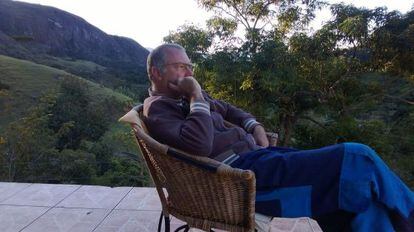Brazil’s toxic environmental politics
Murder victim was investigating illegal dumping in reserve river, family say


The Brazilian police say that their investigation into the death of Spanish environmentalist Gonzalo Alonso Hernández is now focusing on the illegal dumping of effluents into the river system in the Cunhambebe State Park, a protected area located 170 kilometers from Rio de Janeiro, where Alonso lived with his wife, Maria de Lourdes Pena Campos, for the last 10 years. The 48-year-old's body was found on August 6 in a waterfall near his home. He had been shot in the head.
The police say that Alonso had made several complaints to the authorities over the years about illegal ranching and logging activities, and are following up possible leads. Alonso's brother Jesús says that the main line of investigation is now into illegal dumping into rivers. "Gonzalo was carrying out regular checks on the water system near where he was found. In the computer that his killers took with them was information that proved illegal dumping was going on," he said on Saturday.
Amnesty International, which has taken up Alonso's case, agrees with this theory. The human rights organization says the killing is just the latest in a spate of attacks carried out on environmentalists in Brazil by the security forces, paramilitaries and criminal gangs. According the NGO, 20 people were killed in the South American country between 2011 and 2012 because of their activities in defending the environment, among them Laísa Santos who was working in the Amazon, and who had been attacked and threatened on several occasions, as well as Alexandre Anderson, the head of an association that had spoken out against damage to the environment in Guanabara state.
The NGO Amnesty says tha Alonso's activism was the motive for murder
Marco Antonio Alves, the police delegate in Rio state, initially said that investigators believed that Alonso had been murdered because of his public complaints against hunting and the burning of land in the reserve where he lived. Alonso's widow, who worked in Rio during the week, returning home on the weekends, confirmed that her husband had made several complaints about illegal hunters in the park and fires started by ranchers.
Gonzalo Alonso was the eldest of five brothers. He leaves behind a 17-year-old son, who lives in Madrid, and who learned of his father's death after it was reported in the media. "We wanted to tell him, but there wasn't time; the boy is in a bad way now," says the victim's brother, Jesús Alonso.
Gonzalo Alonso last saw his family at Christmas, but didn't speak about his work. He had left his job with Telefónica to concentrate on environmental activities. "We were concerned that he lived in such an isolated spot, in case he became ill or had an accident. But we never imagined that he would be killed for reporting illegal dumping," says his brother.
Neighbors phoned Gonzalo Alonso's family late on August 5 to say that he had disappeared. They offered to look for him, but said that they were sure that he had already been killed. "My brother's widow contacted his former employers at Telefónica, and senior staff there pressured the Brazilian police to investigate," says Jesús. Eight hours after he had been murdered, Gonzalo's body was found at the foot of a waterfall in the very river he was supposedly monitoring for illegal dumping.
The day before a helicopter had flown low over the area, which is unusual"
The police investigation is still underway, but Gonzalo's family say that they have little hope that his killers will be found. "The day before, a helicopter had flown low over the area, which we have been told is unusual," says Jesús Alonso. "We believe that it was reconnoitering the area, trying to locate my brother. Anybody who has those kinds of resources can certainly afford to bribe the police and other authorities," he adds.
Two of Gonzalo's brothers have gone to Brazil to oversee the funeral arrangements. Gonzalo Alonso had left instructions that he wished to be cremated, but he will now be buried in a local cemetery: the Brazilian authorities will not allow the body to be returned to Spain or cremated, in case DNA tests have to be carried out. The family is in contact with an official from the Spanish consul in Rio de Janeiro, who is keeping them informed of developments.
The family says that their only hope now is that Gonzalo's death prompts the Brazilian authorities to act to protect the environment in the area where he was working. "At least then his death would not have been a waste," says Jesús Alonso.










































